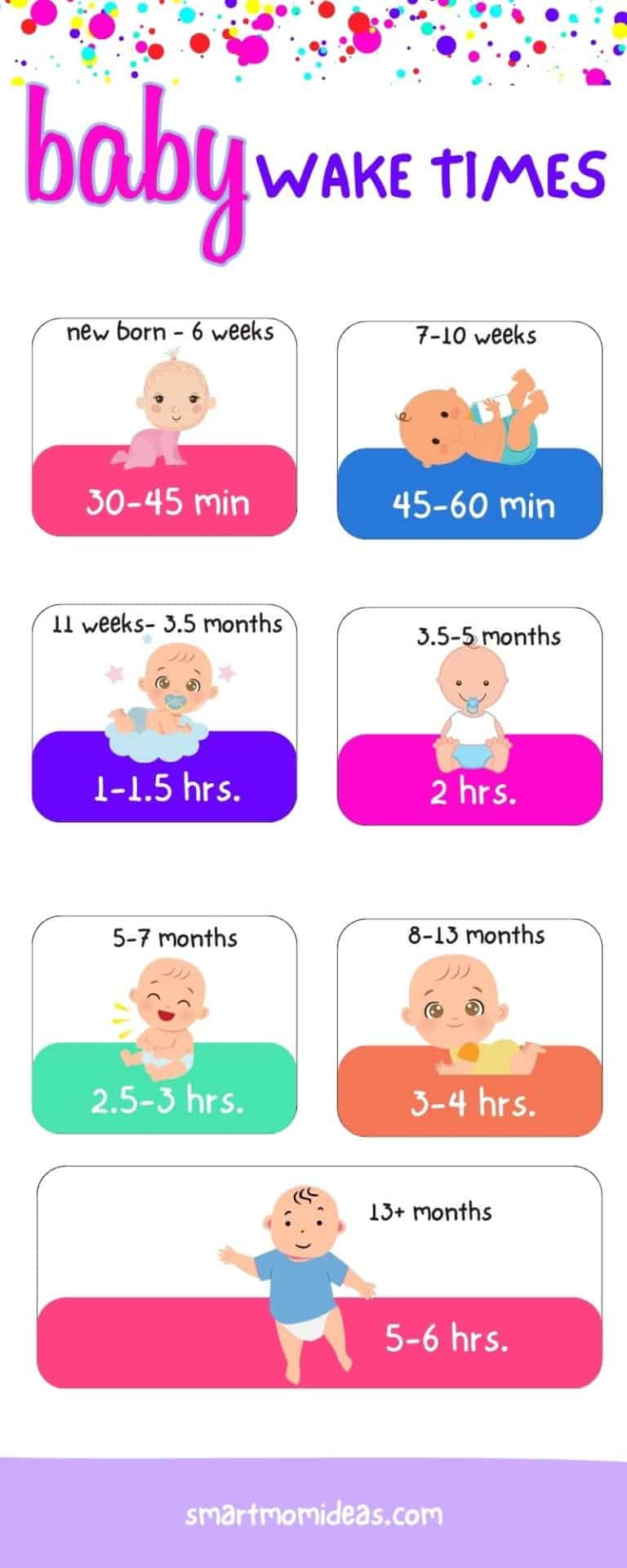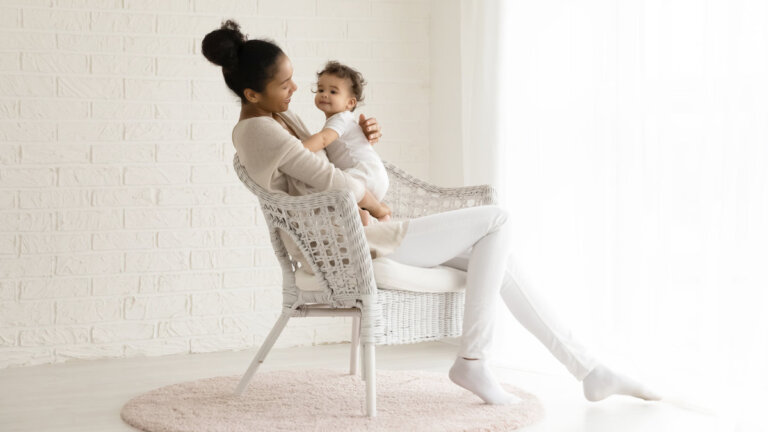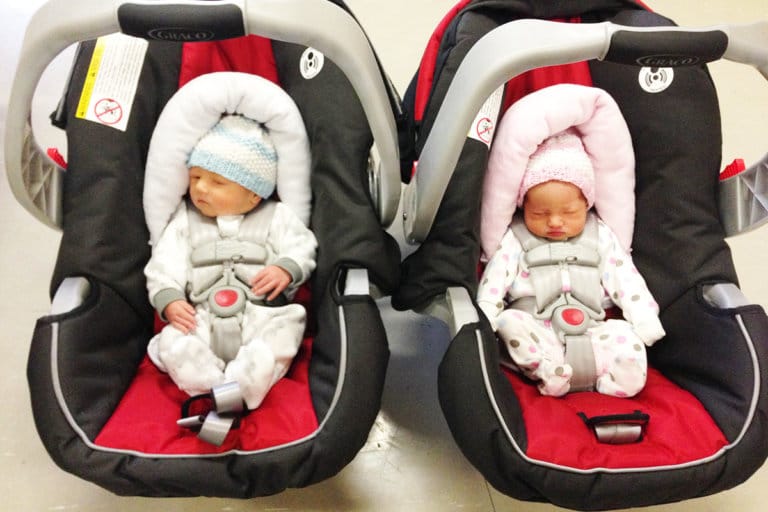Know your newborn wake hours to help you as a new mom
Are you struggling to establish healthy sleep habits with your newborn?

As a mom to twins, I understand how difficult it can be to establish healthy sleep habits when it comes to newborns – trying juggling two wake windows!
And to help my babies develop healthy sleep patterns, I had to learn all about newborn wake windows.
It was no use to have one twin cry and wake the other twin and cycle this all night!
Newborns need a lot of sleep – up to 16-17 hours a day – and it’s crucial that they get the right amount of rest to support their growth and development.
By understanding your baby’s wake windows, you can create a sleep routine that works with their natural sleep patterns.
This will help reduce overtiredness and ensure that they (and you!) are getting the right amount of rest through the night.
So let’s take a look at what newborn wake windows are and how you can use them to promote healthy sleep habits for your little one:
What Are Newborn Wake Windows?
Wake windows refer to the amount of time that a baby can stay awake without becoming overtired.
When a baby stays awake for too long, they can become overtired, which can lead to fussy behavior, difficulty settling down for sleep, and disrupted sleep patterns.
For newborns, these windows are short and typically range from 30 minutes to 90 minutes, depending on your baby’s age.
As your baby grows, these windows will gradually increase, and they’ll be able to stay awake for longer periods.
Here’s a handy infographic to help you see the newborn wake times.

It’s important to note that every baby is unique, and their wake windows may vary from day to day.
Some babies may have longer wake windows than others, and some may be able to stay awake for longer periods than others.
You’ll need to observe your baby’s sleep patterns to determine their ideal wake windows.
Just remember to be flexible and adjust your baby’s routine to meet their needs, especially if they are struggling to settle down to sleep or showing signs of overtiredness.
For my twins, I put them down for their nap at the same time but after a few months I noticed that my daughter wouldn’t fall asleep right away.
I had to meet her needs and kept her up while I put my son down for a nap and had special 1:1 time with her until she showed me her tired cues.
By working with your baby’s natural sleep patterns and paying attention to their cues, you can make sure they get ample rest.
Why Are Newborn Wake Windows Important?
Newborn wake windows are essential for a baby’s health and well-being.
During the first few weeks of life, babies need to sleep for 14 to 17 hours a day, but it’s not just about the quantity of sleep.
It’s equally important that they get the right amount of sleep at the right times.
When a baby becomes overtired due to not getting enough sleep or missing their sleep window, they may become fussy, irritable, and have a hard time settling down for sleep.
Overtiredness can also lead to disrupted sleep patterns, making it difficult for a baby to learn how to self-soothe and settle down for sleep on their own.
Understanding your baby’s wake windows can help you create a sleep routine that works with their natural sleep patterns, helping them get the right amount of sleep and reducing the risk of overtiredness.
This can also help you plan your day around your baby’s sleep schedule and ensure that they are getting the rest they need.
Overall, paying attention to your baby’s wake windows is crucial in establishing healthy sleep habits and promoting their physical and emotional development!
How to Work With Newborn Wake Windows

Now that you understand what newborn wake windows are and why they’re important let’s explore how to work with them.
Here are some tips for establishing a sleep routine that works with your baby’s wake windows:
1. Observe Your Baby’s Sleep Cues
Your baby will give you plenty of clues when they’re ready for sleep. These can include rubbing their eyes, yawning, and becoming fussy.
By observing your baby’s sleep cues, you can work out when they’re ready for a nap and plan your day around their sleep schedule.
It’s important to note that not all babies show the same sleep cues, so you’ll need to pay attention to your baby’s individual signals.
2. Keep Track of Sleep Times
In the early weeks and months of your baby’s life, it’s a good idea to keep a sleep log.
This can help you track your baby’s sleep patterns and identify their ideal wake windows.
You can use a notebook or a sleep tracking app to record when your baby goes to sleep and wakes up, as well as the length of their naps.
3. Follow a Consistent Sleep Routine
Creating a consistent sleep routine is essential for newborns.
This can include a bath, feeding, and a story or lullaby before bed.
By establishing a routine, your baby will learn when it’s time to sleep, which can help them settle down more quickly.
It’s important to be consistent with your sleep routine, even on weekends or during vacations, to help your baby maintain a consistent sleep schedule.
4. Keep it Quiet and Dark

As a general rule of thumb, newborns require a lot of sleep, and it’s important to create a quiet and dark environment to help them get the rest they need.
One way to achieve this is by reducing external noise and minimizing any sources of light in your baby’s room.
You can use blackout curtains to block out light and white noise machines to reduce outside noise.
Keep in mind that newborns have a different sleeping pattern than adults, so while they may be used to sleeping through some noise, it’s essential to keep the room as quiet as possible.
5. Comfortable Temperature
The temperature of your baby’s room can also affect their sleep quality.
According to the American Academy of Pediatrics (AAP), a comfortable room temperature for a baby should be between 68 and 72 degrees Fahrenheit (20-22 degrees Celsius).
Be sure to dress your baby appropriately for the temperature, as overheating can lead to discomfort and disrupt their sleep.
6. Consider Co-Sleeping
Co-sleeping is a popular practice among many families, and it can provide several benefits for both the baby and the parents.
Sleeping next to your baby can help regulate their breathing and temperature, and it can also create a sense of security and comfort for your little one.
You can use a bassinet in your bedroom to make dealing with your newborn’s wake windows easier!
However, it’s important to follow the AAP’s guidelines for safe co-sleeping, such as using a firm sleep surface, keeping soft objects and loose bedding out of the sleep area, and ensuring that the sleep surface is free of any gaps or openings.
7. Be Flexible
As mentioned earlier, newborns’ wake windows may vary from day to day, and it’s essential to be flexible and adjust your routine accordingly.
Your baby’s sleep needs may change as they grow, and it’s important to pay attention to their sleep cues and adjust their sleep schedule as needed.
If your baby is struggling to settle down for sleep, you may need to adjust their wake windows or try a different sleep routine.
Remember that every baby is unique, and it may take some time to find the sleep routine that works best for your little one.
Challenges and Tips for Managing Wake Windows With Twins

As I mentioned before, I have twins, so I completely understand the struggles that come with managing two wake windows!
Managing wake windows is especially challenging for parents of twins, as it can be difficult to coordinate their sleep schedules.
However, with a few tips and strategies, it’s possible to manage wake windows for both babies and ensure they get the rest they need.
One common challenge for parents of twins is that their babies may have different wake windows. One twin may need more sleep than the other, or their sleep patterns may be different.
To manage this, it’s important to observe each baby’s sleep cues and develop a sleep routine that works for both of them.
It may be helpful to stagger their sleep times so that one baby is sleeping while the other is awake.
Another challenge is managing the wake windows when one baby wakes up earlier than the other.
In this case, it’s important to keep the awake baby engaged in quiet activities that won’t disturb the sleeping baby.
You can also use white noise or a sound machine to create a peaceful environment for both babies.
To manage wake windows for twins, it’s important to be flexible and willing to adjust your routine as needed.
You may need to experiment with different sleep schedules to find what works best for your babies.
With patience and persistence, you can establish healthy sleep habits for both of your little ones!
How to Balance Wake Window Times with Feeding and Diaper Changes
One of the biggest challenge I had with my twins was creating a schedule for feeding times and sleep times.
I wanted to honor their wake window but it was hard when I just needed a break or had important errands to run.
The key to finding a balance between their wake windows, feeding, and diaper changes for me was establishing a flexible routine and understanding my baby’s cues.
I began by observing my baby’s natural sleep patterns and hunger cues to determine their preferred schedule. I remembered that each baby is unique, and their wake windows may vary slightly. Once I kept my daughter up a little longer I began feeding them at different times.
I worked on having set feeding times though as I wanted to eat as a family and that was important. But for breastfeeding breaks or bottle breaks, I fed them at different times depending on their wake windows.
Newborn Wake Windows Are All About Healthy Sleep Habits
In the end, establishing healthy sleep habits early on not only benefits your babies but also helps you as a parent get the rest you need to care for your little ones.
So, pay attention to those wake windows and work with your babies’ natural sleep patterns to ensure they get the rest they need to grow and thrive!
How do you manage your baby’s wake windows?
Let me know in the comments.




Leave a Reply